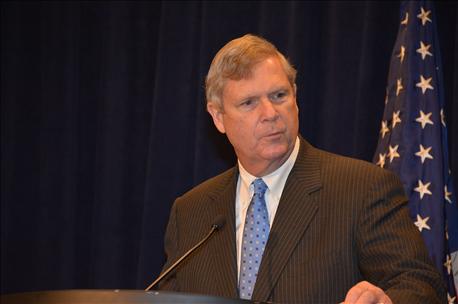
You hear a lot about the high number of consumers who feel they have a “right to know” about their food. But isn’t it interesting that the debate has focused just on GMO and not a totality of what’s in their food?
Unfortunately fear sells, and for agriculture, we’re drowning in the shouts from activists about untruthful statements about our food. And state legislatures, such as Vermont, has even moved their own labeling regulations which has brought to the forefront the challenges that a 50 state - or even more when localities are taken into account – as a patchwork of different labeling standards that may in the end not bring forth any meaningful information to consumers.

Sec. Vilsack continues to make a strong case for the need for Congress to pass a solution that prevents a patchwork of state and local regulations on food labeling.
Secretary of Agriculture Tom Vilsack has been steadfast in his support for a uniform national food labeling standard for GMOs. This week, his message was that Congress needs to act — and act quickly.
Earlier this year, Vilsack said he spent seven hours in a room with people on both sides of the GMO labeling debate trying to come up with a solution. In the end, none was reached.
So, he said it's time for Congress to either make the decision — or delegate someone else to be forced to make the decision on how to handle GMOs.
Since being in the middle of this debate, Vilsack said the challenge is to create a process that respects people's right to find out information about food that's important to them but to do it in a way that doesn't send a false impression about the safety of the product. In addition, it's also important to not just home in on genetic engineering, or GMOs, as other technologies and food issues should offer the same transparency.
“This is not the first or last time we're going to have this conversation about a production method or how food is produced,” Vilsack said. The final labeling standards need to be flexible enough to add or subtract as issues arise in terms of what people want in their food.
Ideas currently on the table include allowing consumers to dial an 800 number, visit websites or scan a QR code. “This needs to be a 21st-century conversation, which may be stuck in the 20th-century,” Vilsack said, questioning whether presenting information in a size-four font really gives consumers what they need.
The Senate Agriculture Committee usually advances bills in a bipartisan fashion, as shown by the farm bill as well as the children nutrition bill and reauthorization bills last year. That wasn't the case, however, when committee chairman Pat Roberts, R-Kan., stepped out without support from Senate Democrats by releasing his Chairman's Mark and hoping that scheduling a markup would bring Democrats to the table.
Roberts' proposal creates a voluntary GMO labeling program through the U.S. Department of Agriculture that requires USDA to define biotechnology and creates an educational program on biotechnology for consumers. His proposal received high support from the food chain, including from producers, cooperatives, agribusinesses, processors, seed makers, handlers, food and feed manufacturers, lenders and retailers.
Originally, he proposed a markup for Thursday, Feb. 25, but it later was delayed until March 1.
Roberts' bill is different from the House-passed version as his would push the pause button on labeling initiatives that are set to go into motion in states — such as Vermont in July — to allow USDA a time period to determine labeling requirements.
About the Author(s)
You May Also Like






